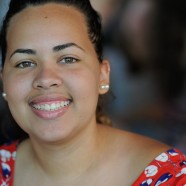
“But if these years have taught me anything it is this: you can never run away. Not ever. The only way out is in.”
—Junot Díaz, The Brief Wondrous Life of Oscar Wao
Aylin Feliz has scripted this line from Junot Díaz into her email signature. “There’s something about me that’s ‘Why not?’” Aylin says. “I can put myself out there. I’ve lived that, and I know why it’s worth doing.”
Aylin’s family is Dominican, and she grew up in Roslindale, Massachusetts. In her eighth-grade class at the Rafael Hernandez public school, 20 of her 28 classmates were also Dominican. The environment was warm, predictable and absolutely consistent. Academically, Aylin was a step ahead, and she was looking to stretch.
After two summers on the Milton campus with the Steppingstone Foundation, Aylin knew that she wanted Milton to be her school. “When my acceptance letter came, my middle-school teacher Jennifer Barefoot Smith (Milton Academy Class of 1997) gave me the best advice of my life. She said, ‘Don’t tell anyone you got in, and make the decision for yourself.’ I like to make everyone happy, so making the decision to go, when none of my friends could understand why, was hard.”
Not only was Milton’s workload more than she expected, but Aylin was straddling two worlds. “Dominican culture tends to be overprotective,” Aylin says. “My mom had a hard time understanding that going to school at Milton meant more than just going to classes. After-school sports and activities were a new concept. My Dominican friends couldn’t understand why I’d want to stay at school until seven o’clock at night. At Milton, I’d talk with my friends at lunch about a book we were reading in class, something I would never have done with my friends from home. I started to drift from my old friends during the school year—we were just on completely different pages. Milton felt so far from home. I tried to imagine how the boarding students must feel. In my neighborhood, I was the only one going ‘so far’ away from home.”
 “At times, I was afraid I had made the wrong decision. My mom didn’t understand Milton completely, but she had worked so hard for me to get here. She believed in me. She said, ‘You’re fine. You’re staying there and you’re going to be fine.’”
“At times, I was afraid I had made the wrong decision. My mom didn’t understand Milton completely, but she had worked so hard for me to get here. She believed in me. She said, ‘You’re fine. You’re staying there and you’re going to be fine.’”
In Spanish class, Aylin’s old self appeared—confident and willing to take risks. Class III was her “breakout” year, she says. She was more comfortable in her classes, and with her new friends. “I figured out it’s okay to stand in the hallway with someone new and talk for five minutes. So much is going on here; there’s a lot to talk about.”
She joined the Latino Association and began to realize she had a lot in common with people who, at first, seemed very different. “Now, I feel like I’ve built a second family,” says Aylin. “I’m in the dorm all the time. I’ve had so many friends over to my house. You learn that everybody is going through the same thing you’re going through.”
Things turned around. The work became manageable. Taking English with J.C. Smith helped her reading and writing skills. She studied Spanish for four years, through Level 5 AP, which involved reading novels and poetry, and writing challenging essays. “I’ve been bilingual my whole life,” Aylin says, “but that class was hard, and I loved it.”
As head of Milton’s Latino Association for two years, Aylin’s goal was sharing Milton with people from the Latino community. “My friends from home don’t know anything about independent schools. They could be here too, but it’s hard work. My motivating factor was, ‘Why not?’ I knew that if I left I wouldn’t have this kind of opportunity again. So I worked hard.”
The first in her family to go to college, Aylin started at George Washington University in September. She plans to major in business administration and finance, and minor in international and Latin American studies. She’s excited, and nervous—but, most of all, confident. “Milton shows you that you have the resources,” says Aylin. “You just have to put in the effort to use them.
“This time, I’ll really be far away, not just 20 minutes from home. But, I won’t start out being shy. I know how to make new friends; I can relate and find out what’s similar. I know how to reach out to teachers, and I’ll ask questions.
“I’ve learned that it’s okay to straddle the middle, with a foot in two worlds. You won’t always understand everything, and it’s okay to feel uncomfortable. But you grow; you accept; you appreciate what you have—and what you will have.”
EEH



